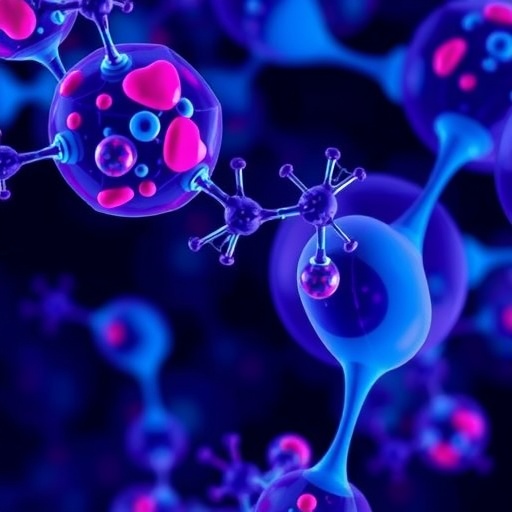A revolutionary advancement in cancer treatment is on the horizon as scientists at King’s College London have developed a novel cancer drug that could significantly improve patient responses to chemotherapy, particularly in tumours that have previously exhibited resistance to treatment. This promising breakthrough targets the sophisticated mechanisms by which tumours defend themselves against the immune system and therapeutic agents, potentially rewriting the future landscape of oncology.
Chemotherapy remains a cornerstone of cancer treatment, yet its efficacy is frequently undermined by tumours’ ability to resist and evade therapeutic attack. Central to this resistance is the presence of tumour-associated macrophages (TAMs), a subset of immune cells that infiltrate tumour microenvironments, particularly clustering around tumour vasculature. These macrophages serve as immunological gatekeepers, creating a fortress-like barrier that prevents beneficial immune cells from penetrating tumours and supporting chemotherapy’s effectiveness.
The team from King’s College London has identified a critical protein produced by these macrophages—heme oxygenase-1 (HO-1)—which plays a pivotal role in this immune evasion strategy. HO-1 catalyzes the degradation of heme into biliverdin, iron ions, and carbon monoxide, exerting potent anti-inflammatory and cytoprotective effects within the tumour milieu. By leveraging this enzymatic function, the macrophages effectively shield cancer cells from immune-mediated destruction as well as the cytotoxic effects of chemotherapeutic agents.
To disrupt this protective shield, researchers engineered a small molecule inhibitor named KCL-HO-1i, designed specifically to inhibit HO-1 activity. The targeted inhibition of HO-1 undermines the macrophages’ ability to protect tumour cells, thereby restoring immune surveillance and enhancing chemotherapy efficacy. This strategic targeting represents an innovative angle in tumour immunotherapy, focusing on the tumour microenvironment rather than directly attacking cancer cells.
Professor James Arnold, leading the Tumour Immunology Group at King’s College London, emphasizes the significance of this approach: “Our discovery reveals that HO-1 expression in tumour-associated macrophages is a key factor limiting chemotherapy effectiveness. KCL-HO-1i enables us to modify the tumour microenvironment, facilitating the infiltration of immune effector cells and enhancing drug delivery, which collectively translate into improved tumour suppression, even in previously resistant cases.”
Remarkably, KCL-HO-1i presents a patient-friendly mode of administration. Unlike many cancer therapeutics that necessitate frequent hospital visits and invasive delivery methods, this drug is formulated as an oral tablet. Patients can conveniently take KCL-HO-1i at home during periods between chemotherapy sessions, greatly easing treatment burdens and improving adherence without compromising therapeutic outcomes.
The preclinical data supporting KCL-HO-1i’s potential are compelling. Utilizing robust mouse models of breast cancer, funded by Cancer Research UK and the Medical Research Council, the researchers demonstrated that combining KCL-HO-1i with standard chemotherapies significantly enhanced tumour regression across diverse chemotherapy regimens. These findings strongly suggest the drug’s utility may extend beyond breast cancer to a broad spectrum of solid tumours, magnifying its clinical impact.
Professor James Spicer, an authority in Experimental Cancer Medicine at King’s College London, remarks, “This drug represents a vital adjunct to current chemotherapy protocols. Our research unmasked one of the tumour’s stealth mechanisms and offered a tangible strategy to overcome it. We are eager to advance KCL-HO-1i into clinical trials to validate its safety and efficacy in patients, potentially transforming cancer care paradigms.”
Supporting this translational endeavor, Professor Miraz Rahman, Professor of Medicinal Chemistry, highlights the interdisciplinary collaboration underpinning this success. “Bridging immunology, chemistry, and clinical oncology enabled us to swiftly move from molecular target identification to drug development. Should clinical trials confirm preclinical promise, KCL-HO-1i could become an indispensable co-therapy, augmenting the effectiveness of existing cancer treatments and potentially reducing reliance on more aggressive therapeutic approaches,” he explains.
Experts beyond King’s College London echo excitement about this novel strategy. Tanya Hollands, Research Information Manager at Cancer Research UK, underscores the importance of optimizing existing treatments through rational combinations. “By pairing new agents like KCL-HO-1i with established chemotherapies, we may accelerate delivery of improved care, leveraging previous clinical experience while mitigating risk. This drug exemplifies the potential of precision medicine to refine and enhance conventional cancer therapy.”
Critical to the drug’s mechanism is reprogramming the tumour microenvironment from an immunosuppressive state to one conducive to immune activation and drug penetration. This reprogramming involves not only inhibiting HO-1 but also diminishing the production of immunosuppressive metabolites and signaling molecules. Subsequent immune infiltration and enhanced chemotherapy-induced cytotoxicity create a synergistic effect, profoundly influencing tumour control.
Looking ahead, the King’s College team anticipates that with appropriate funding, human clinical trials for KCL-HO-1i could commence within the next two years. These trials will probe not only safety and tolerability but also the drug’s capacity to overcome chemoresistance in diverse patient cohorts. Success in these studies would mark a pivotal advancement, becoming a new weapon in the oncologist’s arsenal against refractory cancers.
This discovery exemplifies the power of multidisciplinary research and innovative thinking in oncology. By targeting the cellular interplay within the tumour microenvironment rather than focusing solely on cancer cells, KCL-HO-1i represents a paradigm shift in therapeutic development. As the oncology community awaits clinical validation, this approach heralds a promising new chapter in the fight against resilient cancers, offering hope for improved survival and quality of life for patients worldwide.
Subject of Research: Development of a novel inhibitor targeting heme oxygenase-1 (HO-1) in tumour-associated macrophages to enhance chemotherapy efficacy.
Article Title: Not provided.
News Publication Date: Not provided.
Web References:
References:
- Full scientific article published in Science Translational Medicine (specific link not provided).
Image Credits:
Credit: King’s College London
Keywords:
Cancer, Cancer immunotherapy, Chemotherapy, Cancer medication, Medical treatments, Clinical medicine, Health and medicine, Life sciences, Pharmacology, Pharmaceuticals




